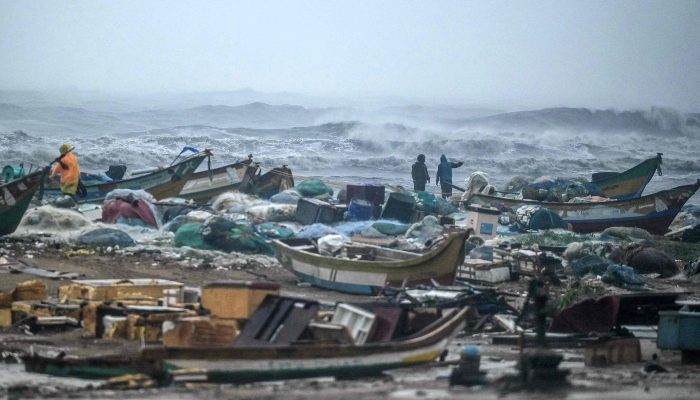
- Cyclone Vengal hits Tamil Nadu with wind speeds of up to 80 km/h.
- Officials reported “minimal” damage, but heavy rain was expected.
- The fungal weakens and turns into a depressive state, reducing the additional effect.
BENGALURU: A low-level cyclone that struck India’s southern coast has killed at least three people but has not caused widespread damage, officials said.
Cyclone Fingal made landfall late Saturday with sustained winds of 70-80 kilometers per hour (43-50 mph).
Three people were electrocuted as a result of the storm in Chennai, Tamil Nadu Disaster Management Minister KK SSR Ramachandran told reporters late on Saturday.
He added that the damage caused by the hurricane was “minimal.”
the Times of India The newspaper reported that the death toll was four, adding that there were “floods” and falling trees, but “not to the extent that is feared.”
Hurricanes—the equivalent of hurricanes in the North Atlantic or hurricanes in the Pacific Northwest—are a regular and deadly threat in the northern Indian Ocean.
While the storm is expected to gradually weaken and turn into a depression later on Sunday, the Indian Meteorological Office warned of heavy rains in parts of southern India.
It advised that fishing operations be completely suspended, and also said that there was a “moderate to high risk of flash floods” in some areas.
Cyclone Fingal circled the coast of Sri Lanka earlier this week, killing at least 12 people, including six children.
Scientists have warned that storms are becoming more powerful as the world warms due to climate change caused by burning fossil fuels.
Warmer ocean surfaces release more water vapor, providing additional energy for storms, leading to stronger winds.
The warm weather also allows it to retain more water, which increases rainfall.
But better forecasting and more effective evacuation planning resulted in the death toll being significantly reduced.
